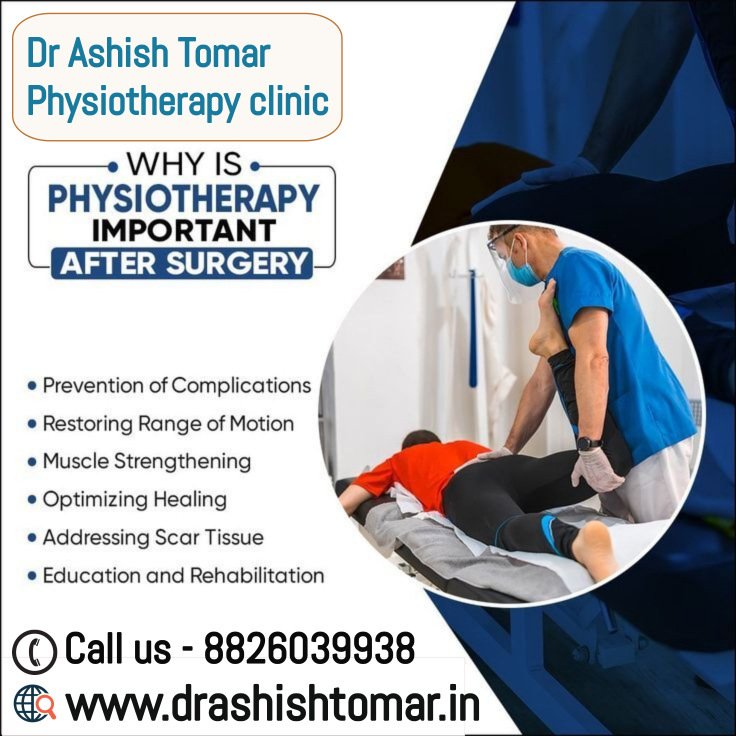Pre and Post Surgical Physiotherapy in Rani Bagh

Physiotherapy, also known as physical therapy, is a treatment method that helps individuals maintain, recover, or improve their physical abilities. The process typically involves a combination of exercises, manual therapy, education, and other interventions. Here’s an overview of what to expect before and after physiotherapy:
Pre-Physiotherapy
1. Initial Assessment:
- Medical History: The physiotherapist will take a detailed medical history to understand your current condition, past injuries, surgeries, and overall health status.
- Physical Examination: This may include assessing your posture, range of motion, strength, flexibility, balance, and functional movements.
- Goal Setting: You and your physiotherapist will discuss your goals and expectations from the therapy, whether it’s pain relief, improving mobility, or recovering from surgery.
2. Preparation:
- Clothing: Wear comfortable clothing that allows free movement. For specific body areas, you may need to expose the affected part for better assessment and treatment.
- Mindset: Be prepared to actively participate in the therapy sessions and follow the home exercise programs diligently.
3. Initial Plan:
- Treatment Plan: Based on the assessment, the physiotherapist will create a personalized treatment plan that outlines the therapy methods, frequency, and duration of sessions.
- Education: Understanding the nature of your condition and the rationale behind the chosen treatment methods.
Post-Physiotherapy
1. Immediate Effects:
- Relief and Recovery: Many people experience immediate relief or improvement in their symptoms, such as reduced pain or increased mobility.
- Soreness: It’s normal to feel some muscle soreness after a physiotherapy session, especially if exercises were involved.
2. Ongoing Management:
- Home Exercises: You will likely be given a set of exercises to perform at home to continue your progress and prevent recurrence of the problem.
- Lifestyle Modifications: Advice on ergonomic adjustments, posture corrections, and activity modifications to support your recovery.
3. Follow-Up:
- Progress Monitoring: Regular follow-up sessions to monitor your progress, adjust the treatment plan as needed, and ensure you are on track to meet your goals.
- Long-Term Goals: Establishing long-term goals to maintain the improvements achieved during physiotherapy and prevent future issues.
4. Outcome Evaluation:
- Assessment: At the end of the treatment plan, a re-assessment to evaluate the overall progress and any remaining issues.
- Discharge: Once you have achieved your goals, you may be discharged with a plan to maintain your progress independently.
Why is Physiotherapy Important After Surgery ?
Physiotherapy plays a crucial role in the recovery process after surgery. Here are some key reasons why it is important:
1. Promotes Healing:
- Improved Circulation: Physiotherapy techniques such as exercises and manual therapy help improve blood circulation, which is vital for delivering nutrients and oxygen to the healing tissues.
- Reduced Swelling: Techniques like lymphatic drainage and gentle movements can help reduce post-surgical swelling and edema.
2. Restores Function and Mobility:
- Range of Motion: After surgery, joints and muscles can become stiff. Physiotherapy helps in gradually restoring the range of motion through targeted exercises.
- Strengthening: Rebuilding muscle strength that may have been lost due to surgery or the inactivity that followed it is crucial. Physiotherapists guide you through safe and effective strengthening exercises.
3. Pain Management:
- Pain Reduction: Physiotherapy can help manage and reduce pain through various modalities like manual therapy, ultrasound, electrical stimulation, and specific exercises.
- Pain Education: Understanding pain and learning how to manage it through movement and posture can be empowering for patients.
4. Prevents Complications:
- Avoids Stiffness and Scar Tissue Formation: Early mobilization and specific exercises help prevent the formation of excessive scar tissue and joint stiffness, which can limit movement.
- Prevents Secondary Issues: Addressing changes in posture and movement patterns post-surgery can prevent secondary issues such as back pain or compensatory injuries.
5. Enhances Recovery Speed and Quality:
- Faster Recovery: Guided physiotherapy helps patients regain function and return to their daily activities more quickly than if they attempted recovery without professional guidance.
- Better Outcomes: Studies have shown that patients who engage in post-surgical physiotherapy often have better long-term outcomes in terms of function and pain levels.
6. Improves Balance and Coordination:
- Relearning Movements: After surgery, especially major surgeries like joint replacements, patients need to relearn how to move properly. Physiotherapy aids in retraining balance and coordination.
- Preventing Falls: For surgeries that affect mobility, such as hip or knee replacements, physiotherapy can help improve stability and reduce the risk of falls.
7. Provides Psychological Benefits:
- Boosts Confidence: Regaining physical abilities through physiotherapy can significantly boost a patient’s confidence and reduce anxiety about their recovery.
- Support System: Regular sessions with a physiotherapist provide emotional support and motivation, helping patients stay committed to their recovery process.
8. Education and Empowerment:
- Self-Management: Physiotherapists educate patients on how to manage their condition independently, including advice on exercises, posture, and lifestyle modifications to prevent future issues.
- Long-Term Health: Patients learn strategies to maintain their health and prevent further injury or complications.
Physiotherapy is integral to a comprehensive post-surgical recovery plan, helping patients achieve the best possible outcomes and return to their normal activities with improved function and reduced pain.
Tag : #PostoperativePhysiotherapy #surgicalrecovery #healthandwellness #physiotherapy #rehabilitation #postsurgeryrehab #strengthaftersurgery #nortdelhiphysiotherapy.

Leave a Reply